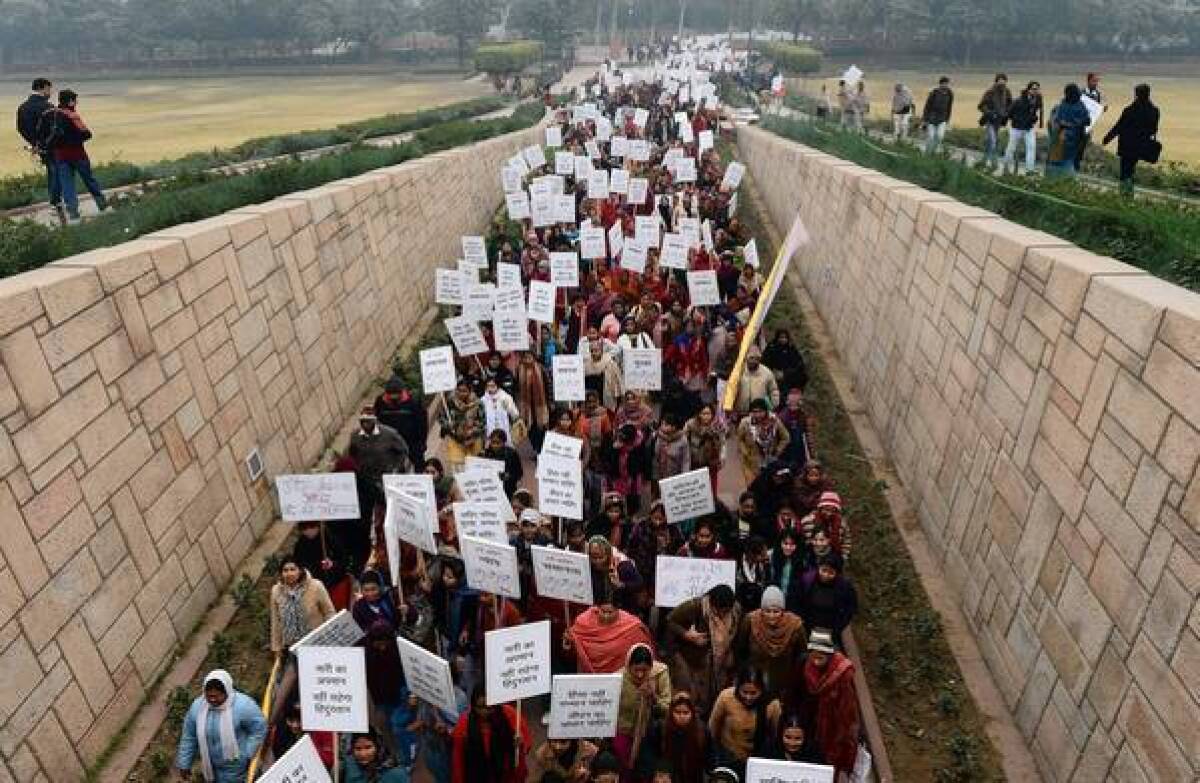Critics say India rape law opens way to more abuse

- Share via
REWARI, India — Vijendera Kumar has been sentenced to work and live in a cow shed for six months, feeding and bathing the animals and shoveling their dung 10 hours a day, seven days a week, after eloping at 17 with his girlfriend. That is in addition to a year the laborer spent in jail.
“They didn’t even investigate my case,” Kumar said, surrounded by 300 lumbering beasts. “Punishing young people for having consensual sex is unfair and backwards.”
Among the most controversial provisions of anti-rape legislation passed Thursday in India’s Parliament — in hurried response to public anger over the fatal mid-December gang rape of a 23-year old physiotherapy student — was a provision setting the age of sexual consent at 18. But even before the law passed, Indian law was flexible enough, as Kumar learned, to make consensual sex among teenagers risky, a paradox in a society where rape has often gone unpunished and marriages are still arranged among the young.
Reformist lawmakers argued in recent days that the age of consent should be 16 to prevent wrongful arrests in a changing society, but conservatives prevailed, fearful that a lower age would encourage premarital sex and undermine Indian morality. It was fixed at 16 from 1983 until February, when an ordinance moved it higher.
Critics say the higher age opens the way for further abuses because parents frequently file rape and kidnapping charges against boys who have consensual sex with their daughters, consigning the boys to jail and the girls into quickly arranged marriages to “protect their honor.”
In India, there’s often a disconnect between law and practice. The legal marriage age is 21 for men and 18 for women, for example, but 47% of Indian women marry younger than 18, according to a 2012 United Nations report, a higher percentage than in Afghanistan or Sudan.
“All these so-called traditional-value people have no problem when children are forced into marriage by their parents,” said Nandita Rao, an attorney. “But they want to criminalize consensual sex. It’s hypocritical.”
The wide-ranging new law also makes stalking, voyeurism, acid attacks and forcibly disrobing a woman explicit crimes, provides capital punishment for rapes leading to death and raises to 20 years from 10 the minimum sentence for gang rape and rapes committed by a policeman. The law doesn’t address marital rape or rape against men, however.
“We have tried to bring in a strong law, which is pro-women and will act as a deterrent,” Home Minister Sushil Kumar Shinde told lawmakers Thursday.
As Kumar, now 23, shovels manure in the 150-by-200-foot enclosure he’s been confined to under his six-month sentence, he reflects on his nightmare, which started in 2007 when he was 17. His girlfriend Pooja, 15, who uses one name, pleaded with him to run away with her. He discouraged her, sensing trouble — Pooja’s family disliked him — but she threatened suicide.
“I knew I’d be blamed either way, for her abduction or her suicide,” he said, sitting on a red plastic chair in the cow shed. “And she promised to say it was her idea, even if we got caught.”
They boarded a train and spent three days sleeping in stations and eating cheap roadside food. On the third evening, a police van spotted them at a bus station. Pooja, true to her word, told them running away was her idea. But her family leaned on the police, Kumar said, and he was charged with kidnapping and rape.
“The family gave the police a $500 bribe,” he added.
Although he was a juvenile, he was sent to an adult prison. He got bail after a year, but it took three more years for the case to be heard. He was sentenced to six months tending cows captured by the police in anti-smuggling operations. He received no credit for time served.
“Only the big people get justice,” he said. “The jail was full of cases like mine.”
Kumar said he didn’t expect to see Pooja again and hoped to get on with his life and marry someone else.
About 20 miles away in Bhuriyawas, Pooja’s father, Deshraj, greets visitors warily. He doesn’t know anything about bribing the police because his brother handled all the arrangements, he said. Neither his brother nor Pooja was available, he said.
“I’ve forgotten about the past,” said Deshraj. “I don’t want to say anything.”
The village has been dishonored by the romance between Kumar and Pooja, said Raghuvir, 45, a farmer living a few doors away, near a slobbering water buffalo.
“It’s important to control girls,” he said, scratching his unshaven face, now that his own daughter is 15, a worrisome age. “We watch over ours very carefully.”
Tanvi Sharma in The Times’ New Delhi bureau contributed to this report.
More to Read
Sign up for Essential California
The most important California stories and recommendations in your inbox every morning.
You may occasionally receive promotional content from the Los Angeles Times.










